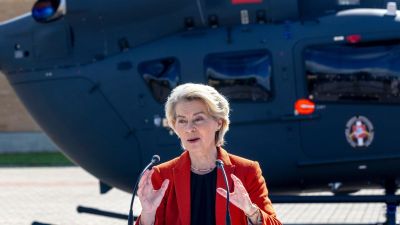Express your voice
8226; I am in half-agreement with Shekhar Gupta Indian Fossil Service, June 28, 2003 on his trenchant analysis of the Indian professional...

8226; I am in half-agreement with Shekhar Gupta Indian Fossil Service, June 28, 2003 on his trenchant analysis of the Indian professional diplomatic system. The article dwells on the ways in which the professionals have been rigid towards China, Russia and the US, and how fresh policy initiatives on all three has come from the political class. This leads him to his 8216;perilous propositions8217;: that the political class has been 8216;8216;a lot more creative8217;, and that of all the wings of government, it is MEA that has kept the media most 8216;captive and friendly8217;.
Yes, most of the initiative on external affairs has come from the political leaders. But we should recall that 8216;policy-making8217; is their prerogative. The professionals have also saved their masters from possible disasters, like at the July 2001 India-Pakistan Agra Summit, from the little that is known of that strange encounter. China policy is a special case. The short, over-simplified answer to lack of initiative is that over the past 15-odd years many officials with specialised expertise, who counselled pragmatic measures, came to be viewed as 8216;soft8217;. In the Indian system the hard-liner all too often wins the inside track, and such was the fate of some of the best regional specialists that we have in the IFS.
Depiction of MEA as vast bureaucracy is way off base. In truth, the IFS is spread too thin for all the roles it should perform. With barely 770 officials of the rank of third secretary and above, it mans MEA, and 113 embassies and permanent missions leaving out of reckoning the 40-odd consulates, as also the officials on deputation, or initial induction training. Of the total, 521 are abroad, giving an average of 4.6 diplomatic-rank officials per mission. There are just 172 in MEA. Comparing the numbers, we get a 8216;headquarters to missions8217; personnel ratio of 1 to 3, which simply means that there are too few at home for adequate policy direction and mission supervision. Other competent systems 8212; Australia, China, France, Germany, Italy, UK, and US 8212; have ratios of between 1 to 1 and 1 to 1.8. Put another way, Brazil has 1,000 officials to man its foreign ministry and about 90 missions; little Singapore with just 24 embassies abroad has 400, half of them at the ministry. Our answer lies partly in closing embassies at places of peripheral interest.
8212; Kishan S Rana
8226; You only have to take a look at the manner in which our personal details are written by the passport offices to infer the standard of sophistication and intelligence that exists in the service.
8212; Adolf
8226; What an apt label for a bunch of file pushers Indian Fossil Service! I happened to visit the Indian Consulate located in the prime AAA category real estate in Singapore in 2001. The moment I stepped inside, the shabby interiors made me realise I am dealing with a third world country. The consulate exists in a typical Indian colonial type building with lots of chips in plaster and torn carpet, The library was a clutter of books. Even the newspapers were six days old.
8212; Laknan
8226; Indian Fossil Service by Shekhar Gupta was a wonderful piece. However, you should see and mention the way Recreational Grant is misused by the Foreign Service Officers. This entertainment grant is supposed to be used to entertain the people who are of any informational use. Rather it is charged to and spent on entertaining each other 8212; more on each other than on guests. Most of the foreign service officers draw their allowances regularly along with their salaries and thus spend it as their own income. Records are falsified from top to bottom.
8212; Gurcharan S Singh
8226; Politicians can be 8216;8216;progressive and flexible8217;8217; because their profession depends on their ability to change agendas, even at short notice, in order to gain friends and attract voters. Bureaucrats appear fossilised Indian Fossil Service, June 28 because they represent permanent interests of the nation state. These interests are permanent because of well-known criteria, such as geography, population, resources, neighbours etc., enumerated by even Kissinger, the guru of today8217;s superpower foreign policy establishment. Specifically, your views do not take into account the fact that the professionalism of the IFs, which you admit as individual traits, is rooted in its belonging to the permanent bureaucracy and institution. The Prime Ministers you have given as examples would not have been so successful in the conduct of foreign policy without such professional diplomats. Specific mistakes in your list: the only leader whose statue was toppled in Moscow was Felix Dzherzhinsky. The opening up to the US and Israel has been successful because of the IFS implementing the political decision, not because the IFS obstructed it. On the WTO, the fact is that the IAS has single-handedly prevented not only the IFS, but other specialised services such as Customs, from representing India in the WTO to the detriment of the country8217;s negotiating performance. Lastly, on the passport offices, it may interest you to know that the country8217;s passport offices are manned by a domestic organisation, and the IFS officers in some not all passport offices are only there on deputation. At least two passport offices in Kerala are under the IAS.
8212; Oblomov
8226; Shekhar Gupta has done well in drawing our attention to an important problem facing all of us in public life, viz. perceptible fall in standards of Services Indian Fossil Service, June 18. Fallen standards pervade the whole society today. It is not confined to one Service. IFS, IAS, IPS, IRS all are tainted by this disease but the word 8216;8216;fossil8217;8217; does not seem to be the right word to describe the IFS. Perhaps it could just be called the 8216;Indian Fallen Service8217;. During the British days, the British officer himself showed the way by his own behaviour. The British had also a good system of appreciating good work and punishing bad work or the shirkers. They discussed matters with their counterparts in other Ministries, more often at the bar of the Gymkhana Club rather than on files and took the decisions while having their beer.
Under Independent India we seem to take delight in putting up notes from the section officer to under secretary, under secretary to deputy secretary, deputy secretary to joint secretary and joint secretary to the minister. The British gave very clear options to their subordinates, either yes or no. The discretion, to take a different decision in special circumstances was only left to the highest officer.
8212; V V Paranjpe
- 01
- 02
- 03
- 04
- 05































